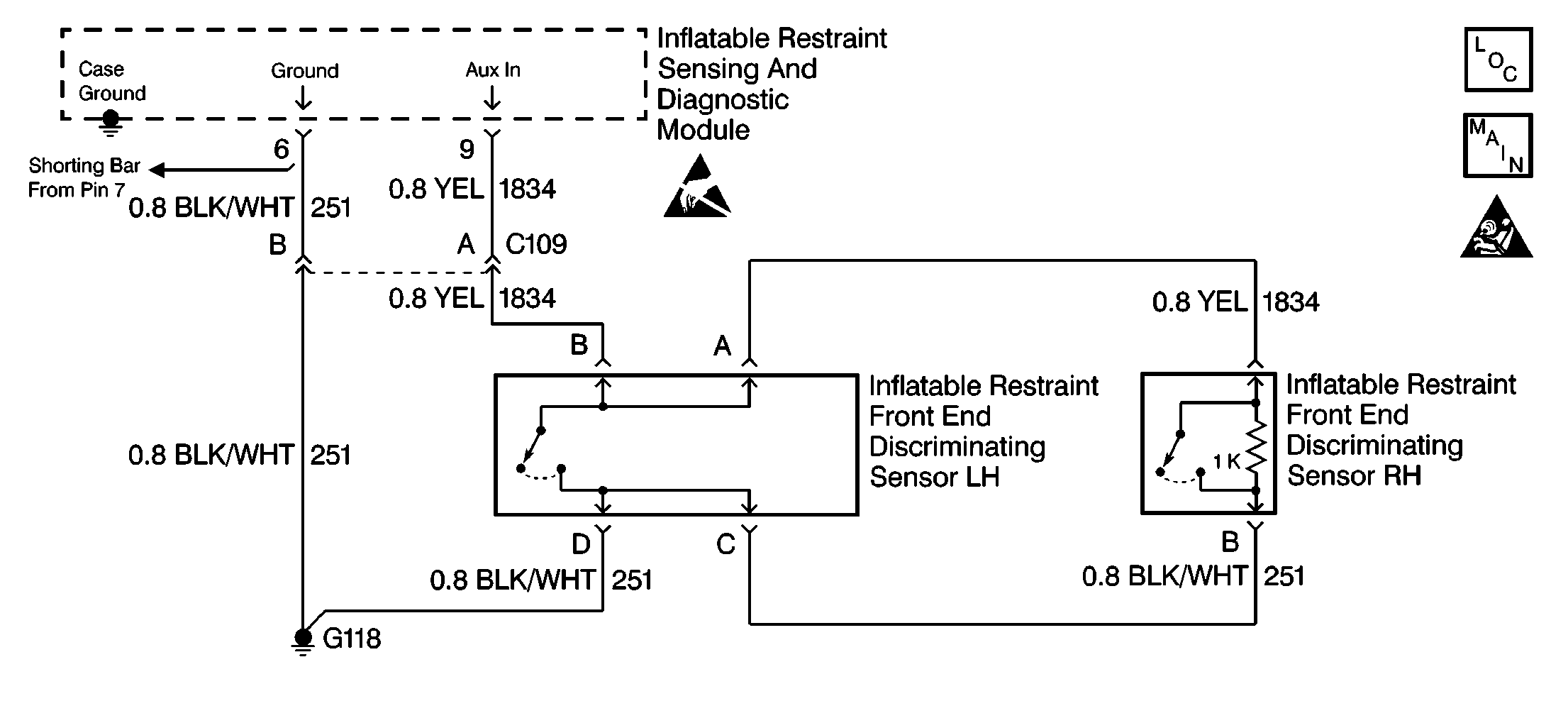
Circuit Description
When you first turn the ignition switch to the RUN position, the inflatable restraint Sensing and Diagnostic Module (SDM) performs tests to diagnose critical malfunctions within itself. Next the SDM measures IGNITION 1, 23 VLR and the deployment loop voltages to make sure they are within their respective normal voltage ranges. Then the SDM proceeds to CONTINUOUS MONITORING. The SDM contains a resistor network connected to 5 volts, ground, and to the SDM front-end sensor signal terminal 9. The SDM monitors two front end discriminating sensors that are wired in parallel. The 1.0 K ohm resistor in the RH inflatable restraint front end discriminating sensor parallel to the normally open switches in both sensors and provides a parallel path to ground. This causes a specified percentage of voltage to appear at the SDM front-end sensor signal input. The SDM monitors this voltage to detect shorts to ground or a closed discriminating sensor.
Conditions for Setting the DTC
| • | The SDM is configured for an inflatable restraint front end discriminating sensor |
| • | The voltage at front-end sensor signal terminal 9 is less than 0.5 volts for 500 milliseconds. |
The CONTINUOUS MONITORING test checks for this DTC. This test occurs when IGNITION 1 is within the normal operating voltage range.
Action Taken When the DTC Sets
| • | The SDM sets a Diagnostic Trouble Code. |
| • | The SDM turns ON the AIR BAG warning lamp. |
Conditions for Clearing the DTC
| • | Current DTC--The voltage at front-end sensor signal terminal 9 is more than 2.4 volts for 500 milliseconds. |
| • | History DTC |
| - | You issue a scan tool CLEAR CODES command. |
| - | Once 250 malfunction free ignition cycles have occurred. |
Diagnostic Aids
A short to ground in the inflatable restraint front end discriminating sensor circuit can cause an intermittent condition. Inspect CKT 1834 carefully for cutting or chafing.
When measurements are requested in this table, use the J 39200 DMM with the correct terminal adapter from the J 35616 Connector Test Adapter Kit. When an inspection for proper connection is requested, refer to Testing for Electrical Intermittents in Wiring Systems. When a wire, connector or terminal repair is requested, use the J-38125 Terminal Repair Kit and refer to Wiring Repairs in Wiring Systems.
Test Description
The numbers below refer to the step numbers on the diagnostic table:
-
This test inspects for a malfunctioning discriminating sensor.
-
This test inspects for a short to ground in CKT 1834.
-
This test isolates the short to ground in CKT 1834 to one side of C109.
Step | Action | Value(s) | Yes | No |
|---|---|---|---|---|
1 | Was the SIR Diagnostic System Check performed? | -- | ||
Is the resistance reading more than the specified value? | 950 ohms | |||
3 |
Is the resistance reading less than the specified value? | OL | ||
4 | With both sensors disconnected, measure the resistance between either sensor harness connector terminal A and ground. Is the resistance reading less than the specified value? | OL | ||
5 | Repair a short to ground condition in CKT 1834 between the two front end discriminating sensor harness connectors. Is the repair complete? | -- | -- | |
6 | Replace the malfunctioning inflatable restraint front end discriminating sensor. Refer to Inflatable Restraint Front End Discriminating Sensor Replacement . Is the repair complete? | -- | -- | |
Is the resistance reading less than the specified value? | OL | |||
Is the resistance reading less than the specified value? | OL | |||
9 | Repair a short to ground condition in CKT 1834 between C109 and the sensor harness connector. Is the repair complete? | -- | -- | |
10 | Repair a short to ground condition in CKT 1834 between C109 and the SDM harness connector. Is the repair complete? | -- | -- | |
11 |
Have all the SIR components been reconnected and properly mounted? | -- | -- | |
12 | Clear all the SIR DTC's. Have all the SIR DTC's been cleared? | -- | -- |
